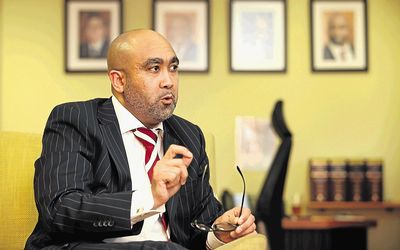Courts may find themselves caught in a sterile ideological struggle
by Khwezi Mayambela,
2016-03-15 05:46:54.0
OVER the past several months editorial pages across SA have been preoccupied with the matters of the judiciary and, more specifically, the appointment and actions of the new National Director of Public Prosecutions (NDPP), Adv Shaun Abrahams.
From Richard Callard to Prof Pierre de Vos to, recently, Willie Hofmeyr, all have dealt extensively with the future of the judiciary and its independence and, in particular, the role of the NDPP as proxies for President Jacob Zuma and Adv Nomgcobo Jiba. These debates are fundamental to the type of state and society we want to build. I believe that certain sections of the media have played their hand, alongside the opposition. It is the media’s right to act in their interest.
The Mail & Guardian (MG), in particular, has covered the goings-on at the office of the NDPP in its main headlines for the past several months. However, what is most shocking about the editorials since Adv Abrahams was appointed is the fact they are replicas of statements issued by the Democratic Alliance (DA) justice spokesperson and former employee of the National Prosecuting Authority (NPA), Glynnis Breytenbach. It is a sad day when a national newspaper like the MG pins its colours on this important matter to the mast of the DA.
The DA has made it abundantly clear that Adv Abrahams is not their candidate of choice. Fortunately, the National Prosecuting Authority Act is clear that the president chooses the NPA boss. So this vehement opposition to Adv Abrahams is met with slander and the undermining of his integrity. The question we have to ask ourselves is why is the DA and Ms Breytenbach are so opposed to Adv Abrahams. So, he took the decision not to charge Adv Jiba based on written opinions from his subordinates. This has aggrieved Ms Breytenbach no end. Now suddenly the entire criminal justice system hinges on this decision and some editors stand up, alongside the DA.
You even have Mr Hofmeyr attacking the integrity of his boss under oath, surely grounds for suspension.
Indeed the Bar Council with the DA has taken the decision to act against Adv Jiba, it is within its rights to do so. However, it’s sad that the Bar Council is prepared to make so much noise on this issue, but is silent on matters of transformation of the Bar Council, access to justice for the poor, transformation of the judiciary, access to briefs to black advocates at the Bar and other matters. I guess it too has pinned its colours to a particular mask, sadly.
On the matter of judicial independence, which Mr Callard goes to great lengths to expose, we must be careful not to become self-righteous about this matter. Politics the world over is filled with conflict and contradiction between the executive and the judiciary; it is inherent in a constitutional state like SA. Not a week passes without the international Economist magazine reporting on constitutional and supreme courts in India, Turkey, Brazil and other countries taking on prime ministers and presidents for actions they deem unconstitutional and an aberration to the rule of law.
The reality is that SA is a vibrant democracy where we fight ideas with ideas. The judiciary is not sacrosanct. Who can forget the vile comment by a leading Cape Town judge in a rape trial in 1999 (not 1979)? Judge John Foxcroft sentenced a father to seven years for raping his 14-year-old daughter, saying: "The harm of the rape was limited to the victim and not society."
What calibre of person (let alone a judge) says this in a society that has emerged from decades of apartheid rule! My only conclusion is that it is someone who has no comprehension of the abuse of women or is ignorant of ills of apartheid.
Our law journals are filled with such statements by judges, even in 2015.
When the African National Congress (ANC) says judges have extended their authority to policy matters, edging closer to the political realm of discourse, it is not a threat or bullying tactic, but stating the obvious. Judges are called on more and more by political parties to resolve their political dilemmas with the ruling ANC through the courts, this is acceptable to some and unacceptable to others.
This is precisely what Judge Denis Davies warned about when he said, "When politics fails, the last (and often only) avenue left to affected parties is to proceed to court. The courts in this country are thus faced with making decisions which may fly in the face of an executive commission or omission, or setting aside legislation which fails to pass constitutional muster or regarding appointments by the executive where the requisite standards of accountability, rationality or transparency have not been followed. The more this trend continues, the more the courts are drawn into the political arena. When, as in recent times, the executive loses cases, the role of the courts is then scrutinised with ever-increasing levels of criticism."
The honourable judge goes further and says, "To what extent can we rely on the courts to be agents of the kind of social change which may be mandated by our progressive Constitution but which raises a plethora of political concerns? The courts are being confronted with a discourse, which I do not see as bound to the social-democratic nature of the Constitution. The constitutional ambition is being undermined by the shrill voices of both the neoliberal right and the populist left. Courts are then caught in the centre of a sterile ideological struggle."
The overtly judicial activism by our courts has far-reaching implications and needs a robust debate in the interests of protecting our Constitution and allowing the majority party to implement its programme and policies based on its electoral mandate in the general elections. The reality is that more and more civil society formations are taking on political mandates of the ANC. I do not have a problem with this, provided you declare your interests in the political domain. Fight an election against the ANC and rubbish it before the electorate, not before our courts.
So, the issue of whether we are failing to uphold the rule of law, undermining judges or, as others have boldly stated, SA is fast becoming a failed state is a debate we in the ANC are ready to fight. The agenda of the opposition for SA under the ANC is no different from the agenda of pre-1994, that black rule under the ANC equates to the end of days for SA.
Today, 20 years later we are free, to say what we want, pray to whom we want, live where we want, take the president to court when we want and for these freedoms no harm comes your way.
• Mayambela is an ANC member from Khayelitsha

CONFLICT: National Prosecuting Authority head Shaun Abrahams has to deal with court cases that threaten the leadership. Picture: SUNDAY TIMES
OVER the past several months editorial pages across SA have been preoccupied with the matters of the judiciary and, more specifically, the appointment and actions of the new National Director of Public Prosecutions (NDPP), Adv Shaun Abrahams.
From Richard Callard to Prof Pierre de Vos to, recently, Willie Hofmeyr, all have dealt extensively with the future of the judiciary and its independence and, in particular, the role of the NDPP as proxies for President Jacob Zuma and Adv Nomgcobo Jiba. These debates are fundamental to the type of state and society we want to build. I believe that certain sections of the media have played their hand, alongside the opposition. It is the media’s right to act in their interest.
The Mail & Guardian (MG), in particular, has covered the goings-on at the office of the NDPP in its main headlines for the past several months. However, what is most shocking about the editorials since Adv Abrahams was appointed is the fact they are replicas of statements issued by the Democratic Alliance (DA) justice spokesperson and former employee of the National Prosecuting Authority (NPA), Glynnis Breytenbach. It is a sad day when a national newspaper like the MG pins its colours on this important matter to the mast of the DA.
The DA has made it abundantly clear that Adv Abrahams is not their candidate of choice. Fortunately, the National Prosecuting Authority Act is clear that the president chooses the NPA boss. So this vehement opposition to Adv Abrahams is met with slander and the undermining of his integrity. The question we have to ask ourselves is why is the DA and Ms Breytenbach are so opposed to Adv Abrahams. So, he took the decision not to charge Adv Jiba based on written opinions from his subordinates. This has aggrieved Ms Breytenbach no end. Now suddenly the entire criminal justice system hinges on this decision and some editors stand up, alongside the DA.
You even have Mr Hofmeyr attacking the integrity of his boss under oath, surely grounds for suspension.
Indeed the Bar Council with the DA has taken the decision to act against Adv Jiba, it is within its rights to do so. However, it’s sad that the Bar Council is prepared to make so much noise on this issue, but is silent on matters of transformation of the Bar Council, access to justice for the poor, transformation of the judiciary, access to briefs to black advocates at the Bar and other matters. I guess it too has pinned its colours to a particular mask, sadly.
On the matter of judicial independence, which Mr Callard goes to great lengths to expose, we must be careful not to become self-righteous about this matter. Politics the world over is filled with conflict and contradiction between the executive and the judiciary; it is inherent in a constitutional state like SA. Not a week passes without the international Economist magazine reporting on constitutional and supreme courts in India, Turkey, Brazil and other countries taking on prime ministers and presidents for actions they deem unconstitutional and an aberration to the rule of law.
The reality is that SA is a vibrant democracy where we fight ideas with ideas. The judiciary is not sacrosanct. Who can forget the vile comment by a leading Cape Town judge in a rape trial in 1999 (not 1979)? Judge John Foxcroft sentenced a father to seven years for raping his 14-year-old daughter, saying: "The harm of the rape was limited to the victim and not society."
What calibre of person (let alone a judge) says this in a society that has emerged from decades of apartheid rule! My only conclusion is that it is someone who has no comprehension of the abuse of women or is ignorant of ills of apartheid.
Our law journals are filled with such statements by judges, even in 2015.
When the African National Congress (ANC) says judges have extended their authority to policy matters, edging closer to the political realm of discourse, it is not a threat or bullying tactic, but stating the obvious. Judges are called on more and more by political parties to resolve their political dilemmas with the ruling ANC through the courts, this is acceptable to some and unacceptable to others.
This is precisely what Judge Denis Davies warned about when he said, "When politics fails, the last (and often only) avenue left to affected parties is to proceed to court. The courts in this country are thus faced with making decisions which may fly in the face of an executive commission or omission, or setting aside legislation which fails to pass constitutional muster or regarding appointments by the executive where the requisite standards of accountability, rationality or transparency have not been followed. The more this trend continues, the more the courts are drawn into the political arena. When, as in recent times, the executive loses cases, the role of the courts is then scrutinised with ever-increasing levels of criticism."
The honourable judge goes further and says, "To what extent can we rely on the courts to be agents of the kind of social change which may be mandated by our progressive Constitution but which raises a plethora of political concerns? The courts are being confronted with a discourse, which I do not see as bound to the social-democratic nature of the Constitution. The constitutional ambition is being undermined by the shrill voices of both the neoliberal right and the populist left. Courts are then caught in the centre of a sterile ideological struggle."
The overtly judicial activism by our courts has far-reaching implications and needs a robust debate in the interests of protecting our Constitution and allowing the majority party to implement its programme and policies based on its electoral mandate in the general elections. The reality is that more and more civil society formations are taking on political mandates of the ANC. I do not have a problem with this, provided you declare your interests in the political domain. Fight an election against the ANC and rubbish it before the electorate, not before our courts.
So, the issue of whether we are failing to uphold the rule of law, undermining judges or, as others have boldly stated, SA is fast becoming a failed state is a debate we in the ANC are ready to fight. The agenda of the opposition for SA under the ANC is no different from the agenda of pre-1994, that black rule under the ANC equates to the end of days for SA.
Today, 20 years later we are free, to say what we want, pray to whom we want, live where we want, take the president to court when we want and for these freedoms no harm comes your way.
• Mayambela is an ANC member from Khayelitsha
























Change: 0.83%
Change: 0.93%
Change: 0.95%
Change: 0.73%
Change: 1.91%
Data supplied by Profile Data
Change: 0.58%
Change: 0.43%
Change: 0.83%
Change: 0.00%
Change: 0.56%
Data supplied by Profile Data
Change: -1.67%
Change: -0.90%
Change: -0.65%
Change: -1.21%
Change: -0.47%
Data supplied by Profile Data
Change: 2.49%
Change: 2.09%
Change: 2.30%
Change: 2.29%
Change: 3.39%
Data supplied by Profile Data